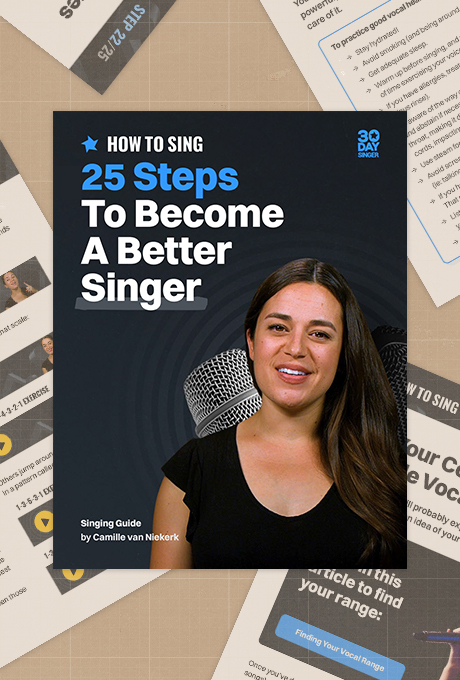4 Things I Wish I Knew as a Beginner Singer
November 6, 2023
I’ve been singing for as long as I can remember. I don’t remember being taught how to match pitch or copy a melody. But there are so many skills I do remember learning, and I strive always to put myself in my student’s shoes as I’m teaching them a new skill. These are the 4 things I wish I knew when learning how to sing.
1. Sounding good isn’t always the goal
Before you roll your eyes, hear me out. Sounding good is the eventual goal, of course! But it’s not necessary or even helpful in every single vocal exercise we do. Some exercises work on functions of the voice that don’t need to sound good. For example, we’ll use yawny or dopey sounds for a number of purposes: to relax, to feel the function of the soft palate, to increase depth. And if your top of mind goal is sounding good, you will prevent yourself from the benefit of that exercise. I tell my students often: exaggerate, and then we can dial back the exaggeration. It’s really difficult to make minor changes when you have deeply ingrained habits. So oftentimes, a silly or weird sound is a necessary step in the process. I wish I’d trusted my teachers more when they asked me to make weird sounds, and I wish I had the confidence and curiosity to ask: what’s the purpose of this exercise?
2. It’s not your job to never crack
I can’t tell you how many times I apologized for cracking in a voice lesson. As if it were my fault, or offensive to my teacher. I promise: your teacher doesn’t care, they’re not going to judge you, and you don’t have anything to apologize for! Your teacher is actually there to help you troubleshoot. It’s their job to figure out: was that crack due to airflow, vowel, intensity, or was it just a little fluke? There are many reasons you might crack in a lesson, and it’s really best for you and your teacher if you let it happen. Fear of cracking often causes you to be tense and to avoid taking risks. And that’s really a shame, because a voice lesson should be a safe, supportive space - exactly the time to take risks, because you have a friendly guide to help you!
3. You don’t have just one sound: you can try on different tone qualities and styles!
I wish I knew this sooner, because I limited myself to just one sound that I liked and felt confident in. I avoided singing in head voice for years because I didn’t want to “sound like an opera singer”. How silly is that! I then went through puberty and was unable to belt in chest voice like I could as a young kid, and I didn’t have the tools to mix, because I’d avoided my head voice and cut off that part of my range. I was eventually forced to “sound like an opera singer”, ironically, when I chose to major in music and had to take two years of classical voice lessons. But I could have avoided a lot of frustration, had I just embraced a variety of sounds from the beginning.
4. It’s fine to not always be working on something new.
That might sound odd coming from a voice teacher. But I believe it’s realistic, and it helps prevent the all too common cycle of motivation, intense effort, and then burnout. You can maintain your skills and enjoy your voice without always pushing for the next goal. Don’t get me wrong: it’s great to stay motivated and curious. I’m all for growth and helping you reach your goals. But that mentality can prevent you from appreciating what you have and enjoying where you’re at. If you love to sing, please keep singing - even if it’s just a casual part of your life. You don’t need to feel guilty about pausing lessons or not practicing every day, especially if that guilt prevents you from just enjoying music.


